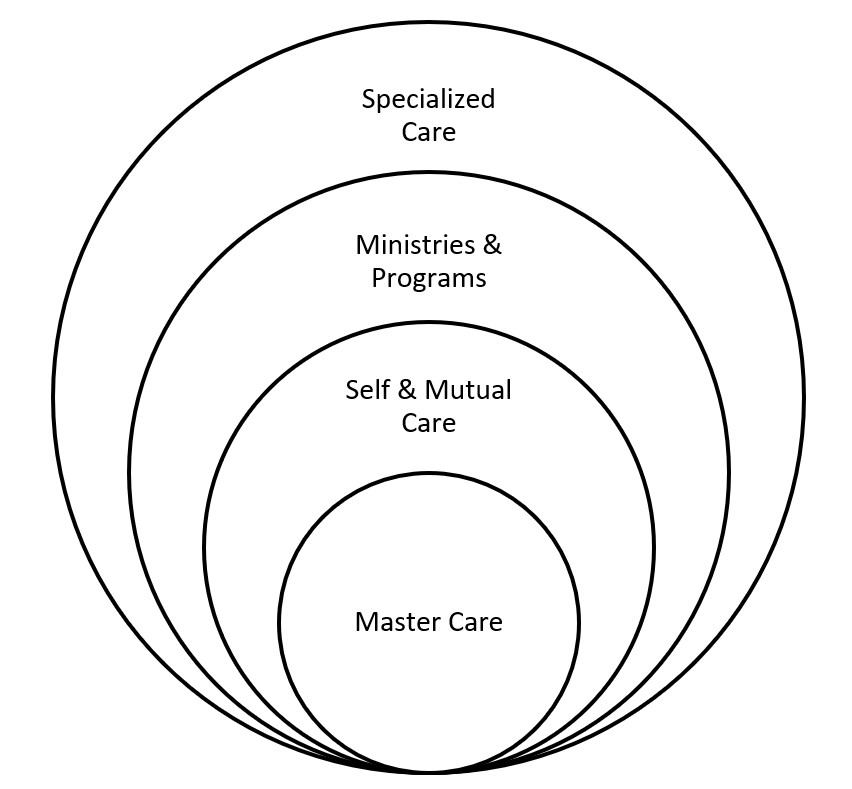A fortieth birthday is the presumptive middle point pit stop we seem to all pull off on this road trip of life. Just before I turned forty, my family moved across the country to a new city. We were forming new relationships and very short-term relationships when I had to decide who to invite to my fortieth. I found it surprisingly challenging and even emotional. A few months later, we experienced a very challenging family crisis. This revealed a similar challenge: Who do I invite into my struggles when I don’t know people very well? Who do you call into life’s celebrations and struggles?
The ambassador of Christ has a calling and ministry to be about in a world in need of reconciliation, but we are also human ourselves. To be healthy – walking through our own wounds, past and memories – requires we not go alone. We need circles of care to help us realize the wholeness we desire for others.
The ambassador of Christ has a calling and ministry to be about in a world in need of reconciliation, but we are also human ourselves. To be healthy – walking through our own wounds, past and memories – requires we not go alone.
The Divine Circle of Care
In God himself, we see a circle of care. In the triune Oneness of Father, Son and Spirit we know a God not only ministering to the world, but God ministering to himself. The wonderful mystery – beyond our comprehension – is that God is One but not alone.
Scripture begins with a Divine conversation we are privy to: “Then God said, ‘Let us make mankind in our image, in our likeness…’ (Genesis 1:26). God’s plan for his creation is the spillover of mutuality and unity. We are made in the image of this unified, eternal, good circle of being and care.
This God who is “one for all and all for one” is seen beautifully revealed in the baptism of Jesus. “Just as Jesus was coming up out of the water, he saw heaven being torn open and the Spirit descending on him like a dove. And a voice came from heaven: ‘You are my Son, whom I love; with you I am well pleased’” (Mark 1:10-11). The Holy One is seen and heard in wonderful, healthy and holy self-interest for the sake of the reconciling of the world. Jesus, God the Son, is not sent on a solo task to bring redemption to us. He is well-cared for by the Father and the Spirit.
This community of care found in God is then embodied in the body of Christ. The church is a circle of care. The gifts empowered by the Holy Spirit are given to create a healthy and whole unity of care. Prophecy, serving, teaching, generosity, leading and doing acts of mercy help us toward wholeness (Romans 12:6-8). Receiving the strengths of others contributes to our own healing and wholeness, and we contribute to theirs.
The one love of God, of course, binds this all together (1 Corinthians 13). Putting into action the love for God and our neighbor – who we are to love as ourselves (Leviticus 19:18; Matthew 22:37-39) – the Apostle Paul instructs Christians to put on compassion, kindness, and humility as we bear with one another, forgive one another, as we let God’s word dwell in us and have it overflow in teaching and admonishing one another into the life ruled by the peace of Christ in our world (Colossians 3:12-17).
The church is the living reality of the circle of care found in God himself.
Slow down and consider:
- Who do you call to celebrate with or help in times of struggle?
- Do you have a circle of care, or are you a lone ranger ambassador?
- To whom do you turn to help heal memories, instruct you in what you don’t know, walk you through the journey of forgiveness, or pray with you? Who makes that list? Who has the gifts?
To give this shape practically, it’s helpful to think about the circles of care described by mission agencies in their caring for workers on the frontlines of Christian ministry around the world.1 Picture it this way:

At the core is Master Care.
This God the Father, Son and Holy Spirit. He is our Master and we start with God and his Good News. Beginning with the Master we know we never go it alone. We go first to Him and his Word to address the joys and sorrows of life.
Secondly, we need Self & Mutual Care.
We give attention to our personal spiritual practice. We need a church family who know and love us. We need spiritual friends. We need people who mourn and rejoice with us, speak truth to us, and are long-haul companions in the practice of the love of God.
Thirdly, we need Ministries & Programs.
We need systems and structures, courses and organized methods that help us in specific areas of life. We need to hear from people who can teach and lead us to new awakenings, skills, and action.
And, we need Specialized Care.
We need – from time to time – gifted people like counselors, therapists, medical doctors, or spiritual directors who can help us through hard and painful realities.
Ambassadors of Christ need these circles of care to not go it alone. But, here’s the thing: we sometimes start at the outside of these circles – with Specialized Care – when we should begin with the Master. We sometimes rely on a professional to help us without having spiritual friendships or our own personal discipleship practices. We sometimes expect a church program or a course to fix us when that’s only a small part of what we need.
So, are you going it alone? Are you starting from the outside edge instead of the inner core? What work do you need to do in each of these circles of care? What might it look like to call upon the Master first and build from there?
1 For this model I am relying upon and adapting the work of Lori Nickel with Multiply (multiply.net).
About


